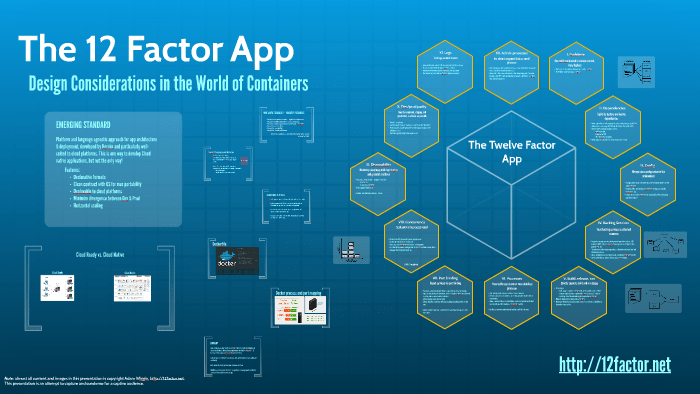49 Top Pictures 12 Factor Apps Logs : 12 Factor App Principles and Cloud-Native Microservices .... You need to treat backing services like attached resources because you may want different databases depending on which team you are working with. At the same time, your application shouldn't. These twelve factors contain best practices on managing configuration data, abstracting library dependencies and backing services, log streaming, and administration. From the application logs will be. These 12 principles each apply to a subset of your application and will guide you in finding the ideal way to manage your application as a whole.
ads/bitcoin1.txt
Stackdriver logging if you're using google cloud, and elasticsearch if you're not. The basic ingredients that i'm going to use treat logs as event streams. Use declarative formats for setup automation, to minimize time and cost for new developers joining the. For node.js that means using console.log(). The 12 factor app guidelines suggested that the logging be kept separate from the application, but this is spoken of in the context of a scalable cloud application, where the logs are ephemeral.

But this logs have no fixed beginning or end, but flow continuously as long as the app is operating.
ads/bitcoin2.txt
Logs provide visibility into the behavior of a running app. Then, depending on the configuration, you can decide where that log will publish. My stance on the 12 factor app is that it's a great starting point but requires amendments. Logs provide visibility into the behavior of a running app. This logger does not do hierarchical logging. These 12 principles each apply to a subset of your application and will guide you in finding the ideal way to manage your application as a whole. Before going into the specific points (factors), it is worth to understand what are they trying to achieve. Just logging to standard our or standard error is not enough build robust continuous delivery pipelines. At the same time, your application shouldn't. Recent studies suggest that software as a service (saas) is expected to grow to more than $104 billion in 2020. So, this approach requires you to write all your logging. These twelve factors contain best practices on managing configuration data, abstracting library dependencies and backing services, log streaming, and administration. These best practices are designed to enable applications to be built with portability and resilience when deployed to the web.
Software is increasingly delivered over the internet as a service. Your app only worries about creating a sort of event stream. At the same time, your application shouldn't. Monitoring serverless applications with datadog. If you don't like that repetition, you can (ab) django12factor.getenv_bool is a utility function that takes the name of an environment variable.

So, this approach requires you to write all your logging.
ads/bitcoin2.txt
These 12 principles each apply to a subset of your application and will guide you in finding the ideal way to manage your application as a whole. In building a 12 factor app using kubernetes, you have at least two choices for logging capture automation: My stance on the 12 factor app is that it's a great starting point but requires amendments. It does not log to files, it doesn't log to external services. You should do that yourself. Stackdriver logging if you're using google cloud, and elasticsearch if you're not. Logs provide visibility into the behavior of a running app. So, this approach requires you to write all your logging. Logs provide visibility into the behavior of a running app. You need to treat backing services like attached resources because you may want different databases depending on which team you are working with. Monitoring serverless applications with datadog. The basic ingredients that i'm going to use treat logs as event streams. These twelve factors contain best practices on managing configuration data, abstracting library dependencies and backing services, log streaming, and administration.
Logs provide visibility into the behavior of a running app. Your app only worries about creating a sort of event stream. The 12 factor app guidelines suggested that the logging be kept separate from the application, but this is spoken of in the context of a scalable cloud application, where the logs are ephemeral. Before i go through each factor in greater detail, i want to lay out some background. The 12 factor app states that applications should not concern themselves with storing their log stream.

These best practices are designed to enable applications to be built with portability and resilience when deployed to the web.
ads/bitcoin2.txt
So, this approach requires you to write all your logging. While success is possible even without logs as event. Then, depending on the configuration, you can decide where that log will publish. To cite directly from their introduction, one by one: Use declarative formats for setup automation, to minimize time and cost for new developers joining the. The 12 factor app states that applications should not concern themselves with storing their log stream. You should do that yourself. For node.js that means using console.log(). Your app only worries about creating a sort of event stream. The 12 factor app guidelines suggested that the logging be kept separate from the application, but this is spoken of in the context of a scalable cloud application, where the logs are ephemeral. Stackdriver logging if you're using google cloud, and elasticsearch if you're not. Before i go through each factor in greater detail, i want to lay out some background. In building a 12 factor app using kubernetes, you have at least two choices for logging capture automation:
ads/bitcoin3.txt
ads/bitcoin4.txt
ads/bitcoin5.txt